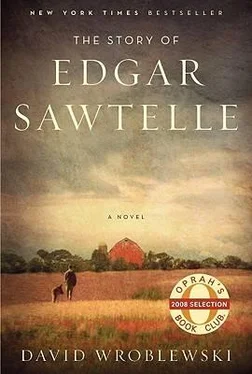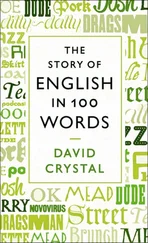WANDERING THROUGH THE KENNEL, holding a book: Winnie-the-Pooh. He opens a whelping pen, sits. The puppies surge through the underbrush of loose straw, kicking up fine white dust as they come along. He captures them between his legs and reads to them, hands in motion before their upturned muzzles. The mother comes over and they peep like chicks when they see her. One by one she carries them back to the whelping box; they hang black and bean-shaped from her mouth. When she has finished, she stands over them, looking at Edgar in reproach.
They wanted to hear, he signs at her, but the mother won’t settle with her pups until he leaves.
Winnie-the-Pooh is a good story for puppies.
If only she would let him tell it.
HIS FATHER, READING TO HIM at bedtime, voice quiet, lamplight yellow on the lenses of his glasses. The story is The Jungle Book. Edgar wants to fall asleep with Mowgli and Bagheera still in his mind, for the story to cross from the lamplight into his dreams. His father’s voice stops. He sits up.
More, he signs, fingertips together.
His father starts the next page. He lies back and moves his hands through the air to the sound of his father’s voice. Thinking about words. The shapes of words.
HE IS SITTING ON THE GRAY leatherette cushion of the doctor’s bench and holding his mouth wide open. The doctor’s face is close, looking into him.
Then the doctor puts alphabet tiles on a table. The doctor asks him to spell “apple,” but there is only one p and he can’t do it right. The doctor turns to a notepad and writes something down while he tries to turn the b upside down so it will be right.
“I’d like him to stay for a few days,” the doctor says. His mother shakes her head and frowns.
The doctor presses a buzzing, flashlight-shaped thing against his throat. “Breathe out,” he says. “Pull your lips back. Touch your tongue to the roof of your mouth. Make a circle with your lips.”
Edgar follows his instructions and a word floats out of his mouth: “Ellooooo.” But the sound is hideous, flies against a pane of glass.
Don’t do that.
The doctor doesn’t understand at first. Edgar uses the letterboard and goes slow for him. On the way home, they drink black cows at the Dog’N’Suds. On his mother’s face, an expression: Sorrow? Anger?
SITTING IN THE WHELPING PEN, watching a new litter of puppies squirm. At five days old, they are too young to name, but this has become his job.
One of the pups is trying to climb over the others, pushing them aside to nurse. He is a bully. His name will be Hector, Edgar decides. Choosing names is hard. At night he discusses it with his mother and father. He is very young, and has only now begun using his dictionary to find names and note them in the margins.
THE DOCTOR BRINGS IN SOMEONE NEW, a man with a beard and black hair that falls to his shoulders. The man signs hello to him, a flick of his hand off his forehead, then asks him something, signing faster than Edgar has ever seen, one sign melting into another.
Too fast, he signs.
He grabs the man’s wrists and makes him to do it again.
The man turns to the doctor, speaks a few words, and the doctor nods.
You sound funny, Edgar signs. The man laughs, and even that is odd.
Do I? he signs. I’m deaf. I’ve never heard my voice.
Edgar stares at him as if he didn’t know a deaf person would look just the same. From behind the man, his mother frowns and shakes her head.
How old are you? the man signs.
Almost four, he says. He holds up four fingers, with his thumb tucked in, bumps the I-hand twice against his heart.
You’re very good. I couldn’t sign like you when I was four.
I’m backward from you. I can hear okay.
Yes. It’s good we both sign.
Can you sign with your dogs? Mine don’t always understand.
My dog never understands, the man signs, smiling.
Almondine understands when I say this. And Edgar signs something that only he and Almondine know. They watch Almondine approach.
The man pauses and looks at the doctor.
STANDING IN THE AISLE OF THE BARN. His father sits in one of the pens with a mother, stroking her ears. The mother is so old even her tail shows gray. She lies on her side, panting. His father points to the ceiling beams running crossways to the main aisle and tells him they came from trees Schultz felled in the woods behind the barn.
“The first spring, leaves sprouted from those beams,” he says, and Edgar sees for the first time the knots and scrapes, sees the tree hidden in each beam and sees as well Schultz and his ponies heaving them up through the field. A string of bare lightbulbs runs the length of the aisle, one descending from every other beam.
“Hang on, gorgeous,” his father says, turning back to the mother.
When Doctor Papineau arrives, Edgar leads him into the barn.
“Over here, Page,” Edgar’s father says.
Doctor Papineau enters the pen and kneels. He runs his hands over the mother’s belly and presses the coined tip of a stethoscope to her chest. Then he walks to his car and fetches a satchel.
Edgar’s father turns to him.
“Go up to the house now,” he says.
From the satchel, Doctor Papineau lifts a bottle and a syringe.
TWO ROLLING HILLS SPAN the south field, one near their yard, one farther out. There’s a rock pile in the middle, and a small grove of birches, and a cross. Waves of hay lie over in the August breeze. Edgar plunges through the field, trying to lose Almondine. Always their game. He cuts around the rocks, dives under a birch and lies as quietly as he can. He peers at the white cross, standing alone between him and the yard, and he wonders again what it means. It is so simple, straight, and square, and sometime not too long before, it has taken on a fresh, brilliant white coat of paint.
Then the stalks of hay part and Almondine trots up, panting. She flops down and presses a paw to his chest as if to say, don’t do that again. It’s too hot for these games. But he jumps up and races away, and she’s there beside him, mouth open in a smile.
So often, she runs ahead.
So often, he finds her waiting when he arrives.
A LATE SPRING AFTERNOON. Edgar and his mother sit on the living room couch. The television shows gray static, and the speakers hiss. All the shades are raised. Clouds like bruises scud over the fields. Outside, a sizzle-flash. There’s a snap from the kitchen as sparks fly from the electric sockets. He counts one, two, three, until the thunder rolls back at them from the hills.
“It’s the iron in the ground, it draws the lightning,” his father has said. “See how red the dirt is? This is where the Iron Range begins.”
The pines flap their branches in the gusts, swimmers in the wind. He walks to the window to see if the treetops actually pierce the clouds. A tatter of white steam passes over the thrashing treetops, sliding counter to the motion of the storm.
“Come away from the window,” his mother says.
Splats of rain hit the glass. Outside, an instant of brilliant light, and sparks leap from the kitchen outlets again. Thunder never arrives, and the extended silence is eerie.
Was that cold lightning?
“Probably.”
There’s hot lightning and cold lightning, she has told him. Only hot lightning makes thunder. The difference is important: a person hit by hot lightning is fried on the spot. A person struck by cold lightning walks away without a mark.
His mother sits on the chair and watches the clouds. “I wish your father would come in here.”
I’ll get him.
“No you won’t. You’ll stay right here with me.” She gives him a look that means no kidding around.
I’m taller than you now, he signs, trying to make her relax. Lately, he’s begun to tease her about being the shortest in the family. She gives him a tight-lipped smile and turns back to the television. He doesn’t quite know what they should be looking for, just that it will be obvious. From a Reader’s Digest article she’s learned about the Weller Method, which they are now performing. The television is tuned to Channel 2 and dimmed until the static is nearly black.
Читать дальше
Конец ознакомительного отрывка
Купить книгу












